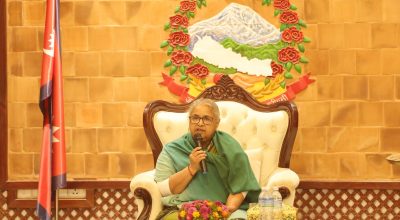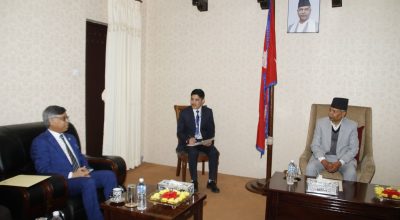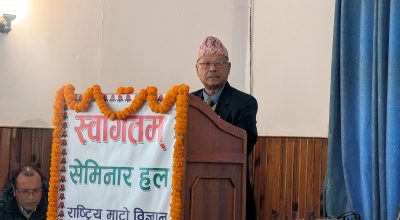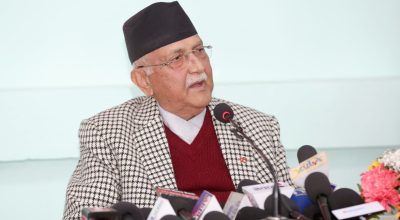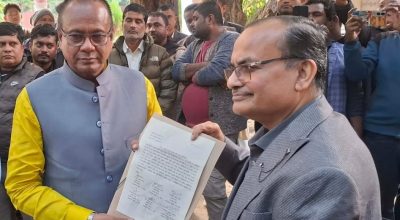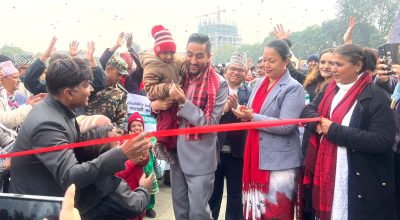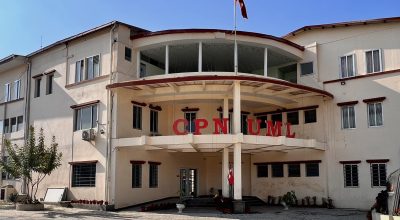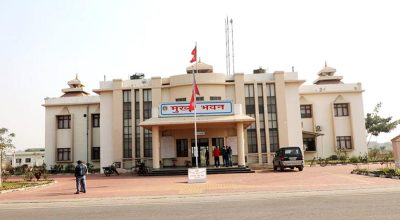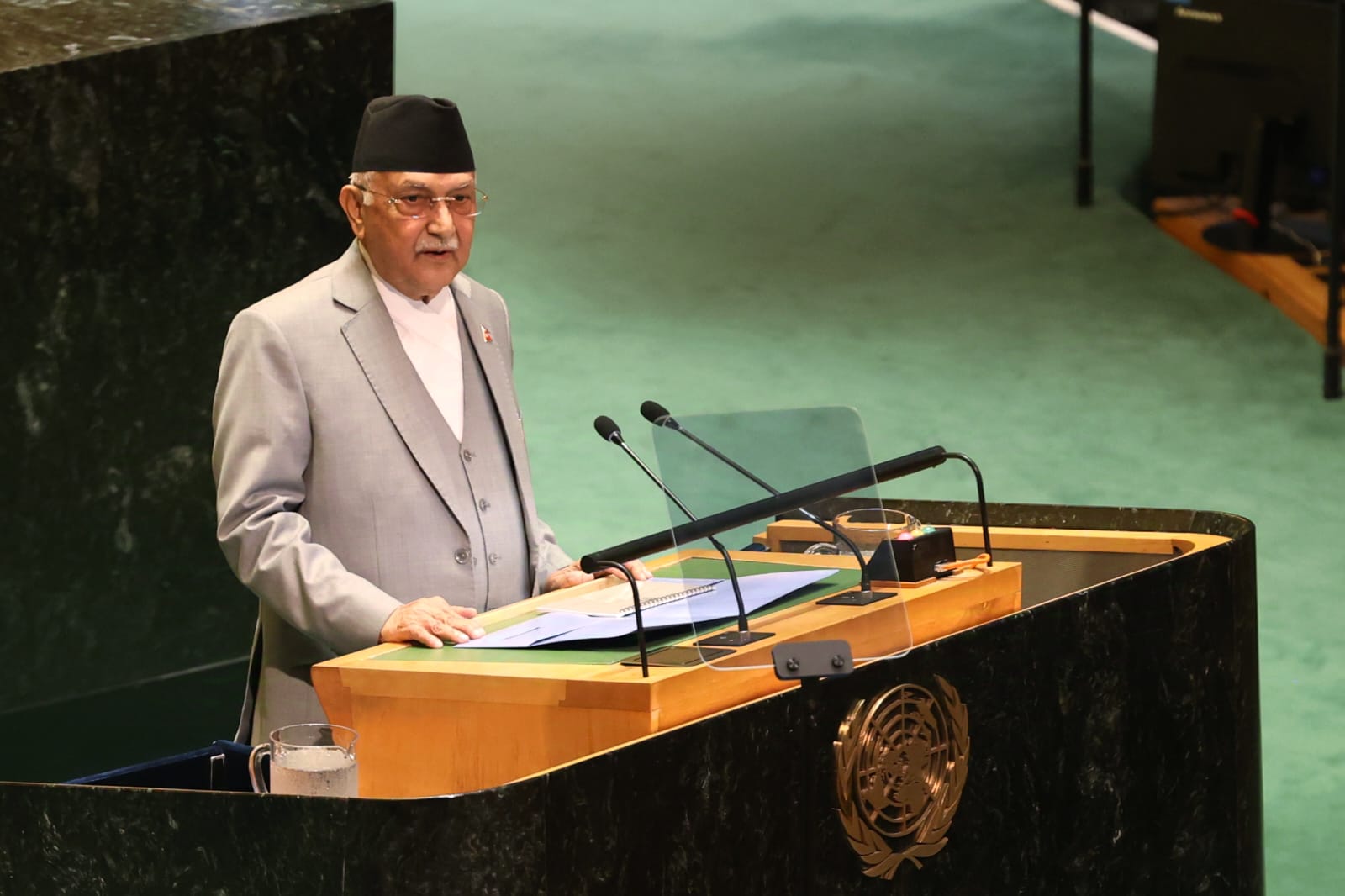
New York (USA), Sept 27: Prime Minister KP Sharma Oli has said as the largest contributor of troops and police to UN Peace operations, Nepal is ready to further enhance its contribution to global peace and security.
Addressing the 79th Session of the United Nations General Assembly (UNGA), Prime Minister Oli called on the international community to march ahead without comprising the prosperity and happiness of future generations.
Explaining about Nepal’s efforts for the establishment of peace after the armed conflict, he familiarized that the parliament passed the Transitional Justice Bill to settle transitional justice issue once and for all.
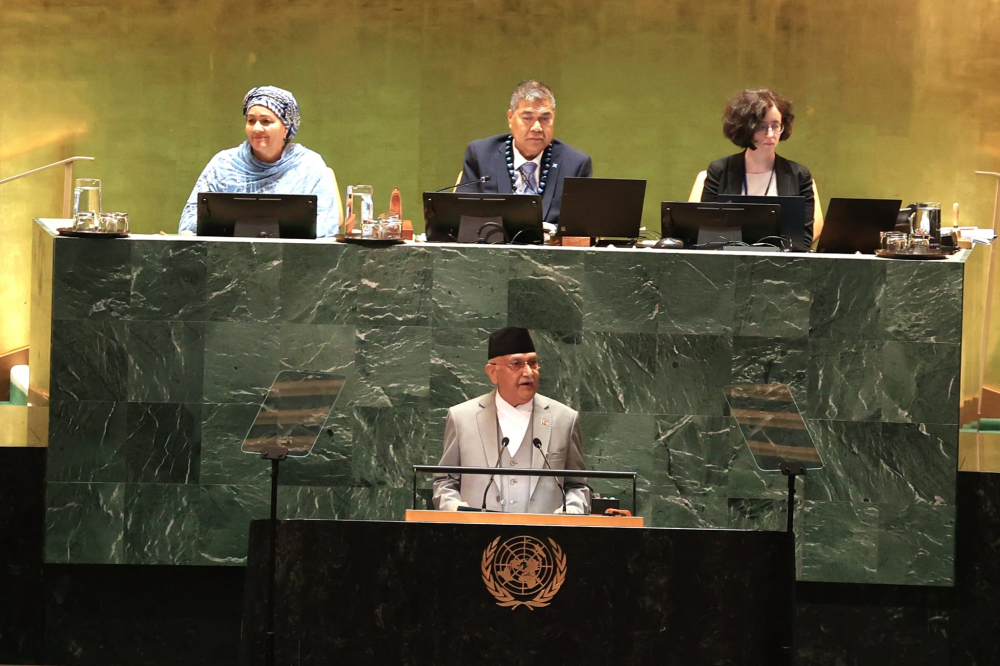
PM Oli shared, “The incumbent government, formed by the collaboration of two major political parties, is determined to secure stability while driving economic transformation for the inclusive and equitable prosperity to our people.”
“We have been conducting our foreign policy with profound belief in ‘Amity with All, Enmity with None. Nepal is committed to further strengthening its close, cordial, and constructive relations with its immediate neighbours and beyond, rooted in the principles of mutual respect, sovereign equality, territorial integrity, non-interference in each other’s internal affairs, and peaceful co-existence”, added the Prime Minister.
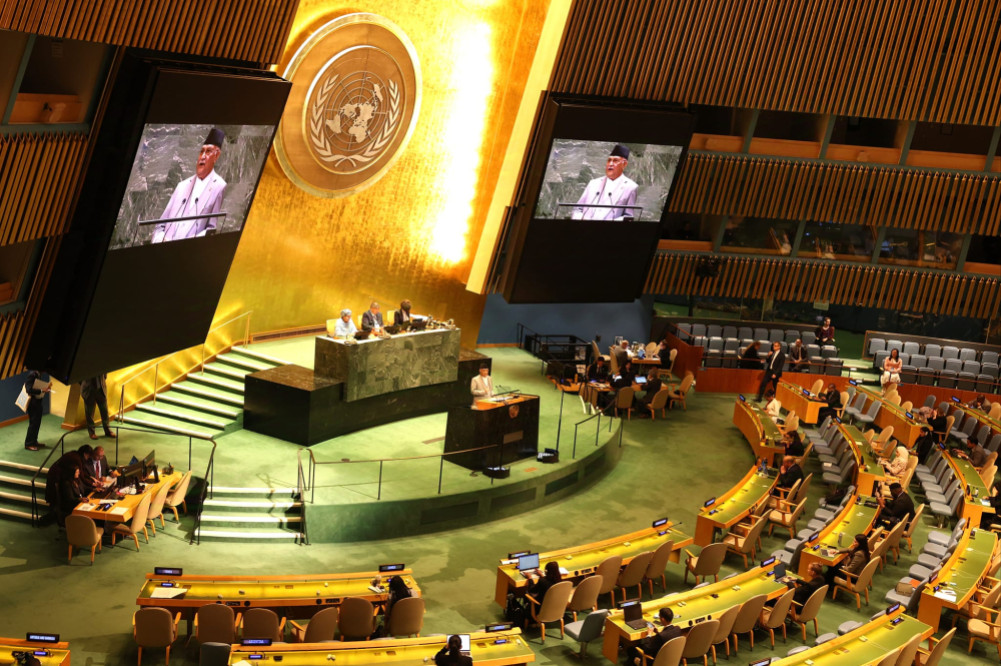
Prime Minister Oli stressed the need of resolving the Israel- Palestine conflict through peaceful dialogue.
“Nepal will be graduating from its LDC status by 2026 and we are diligently working towards achieving the Sustainable Development Goals (SDGs) by 2030. But there is a financial gap of about 24 billion US dollars to attain the 2030 Agenda, he opined.
First Lady Radhika Shakya, Minister for Foreign Affairs, Dr Arzu Rana Deuba, Prime Minister’s Chief Advisor Bishnu Prasad Rimal, Foreign Secretary Sewa Lamsal, Permanent Representative of Nepal to the United Nations Lok Bahadur Thapa and other members are in PM’s official delegation.
Prakash Silwal/RSS
Full text of statement delivered by PM Oli at 79th UNGA
Kathmandu, Sept 27: The full text of statement delivered by Prime Minister KP Sharma Oli at the 79th Session of the United Nations General Assembly (UNGA) is as follows:
Mr. President,
Your Excellencies the Heads of State and Government,
Mr. Secretary General,
Distinguished Delegates,
Ladies and Gentlemen.
I stand here as a humble representative of thirty million proud Nepali people.
At the very outset, allow me to extend my sincere congratulations to you, Mr. President, and distinguished members of the Bureau on your well-deserved elections. I would also like to reaffirm Nepal’s full support as you undertake the important responsibilities entrusted to you.
We extend our deepest appreciation to His Excellency Mr. Dennis Francis, the outgoing President, for his commendable leadership in successfully guiding the 78th Session of the Assembly.
Our highest accolades are due to the Secretary-General, Mr. António Guterres, for his tireless dedication to reinforcing multilateralism in tackling global challenges.
I fondly recall your visit to Nepal last year, Mr. Secretary-General, and your message of peace from the sacred birthplace of Gautam Buddha, and the message of climate catastrophe of mountains from the Everest region.
Mr. President,
The world is at a watershed moment in history.The contrast between rich and poor, harmony and hatred, and economic development and environmental destruction have never been as stark as they are today.
Both people and planet stand on the brink of climate catastrophe.Geopolitical rivalries are resurging.
Military expenditures are skyrocketing along with an unabetted arms race.
The spectre of nuclear conflict looms larger than ever before.
On one hand, our economy remains frail, still grappling with the lingering effects of the COVID-19 pandemic, on the other, nationalism and protectionism have re-emerged, even before we have reaped the benefits that liberalisation and globalisation were meant to deliver.
Even after three hundred years of industrialization and modernization journey, it is deeply troubling that in our so-called civilized world of 21st century, wealth and prosperity are concentrated mostly at the hand of Global North and the poverty and destitution are heavily concentrated in the Global South, particularly in the least developed countries (LDCs).
To overcome these travesties, we must demonstrate our leadership that promotes meaningful cooperation and collaboration.
It is only through collective will and unified action that we can turn the tide and usher in an era of enduring peace and shared prosperity for all.
In this context, the theme of this Session “Leaving No One Behind: Acting Together for the Advancement of Peace, Sustainable Development and Human Dignity for Present and Future Generations,” could not be more timely or relevant.
We have reaffirmed our commitment through the ‘Summit of the Future’ to build a safe, just, and sustainable world for both present and future generations.
This pledge is embodied in the three pivotal documents we have adopted: Pact of the Future, Declaration on Future Generation, and the Global Digital Compact.
We must demonstrate our determination to implement these documents for the wellbeing of present and future generations.
Mr. President,
Allow me to underline that the principle of ‘Leaving No One Behind’ has long been the cornerstone of Nepal’s approach to development across all sectors.
This philosophy is enshrined in our Constitution which upholds the values of democracy by guaranteeing inclusivity, equality, justice, proportional representation, human rights, and social protection for the most vulnerable sections of society.
I am determined to lead my country with my deep conviction to ‘comprehensive democracy’.
For me, comprehensive democracy ensures equal rights, equal access to opportunities, social justice, protects the vulnerable communities, and provides the security and dignity for all individuals.
Democracy goes far beyond the right of the people to choose their leaders. It is about leading the people towards prosperity and happiness so that they could feel highest level of dignity.
At the international level, sovereign equality and mutual respect constitute the bedrock of comprehensive democracy.
These principles are essential for building the frameworks of a just, inclusive, equitable, representative, and accountable global order.
Mr. President,
As a nation emerging from conflict, Nepal deeply understands the profound value of peace and political stability.
Since the signing of the Comprehensive Peace Accord in 2006, Nepal has been firmly focused on completing the peace process at the earliest.
Immediately after the formation of my government, parliament passed a Transitional Justice bill to settle transitional justice issue once and for all.
While we implement the law, we will uphold victims’ rights, including truth and justice.
We will also use reparations and reconciliation to heal the wounds and scars of conflict period. We appreciate support from international community including the UN system in this regard.
The present government, formed by the collaboration of our two major political parties, is determined to secure stability while driving economic transformation for the inclusive and equitable prosperity to our people.
At this juncture, stability and economic transformation are paramount to us than our periodic competition in elections.
We have dedicated ourselves to realizing our national aspiration: ‘Prosperous Nepal, Happy Nepali.’
Nepal will be graduating from its LDC status by 2026. We are diligently working towards achieving the Sustainable Development Goals (SDGs) by 2030 and aspire to become a developed country by 2043, despite facing significant economic headwinds.
However, our path to achieving the SDGs remains fraught with difficulties. We are confronted with a substantial financial gap of about 24 billion US dollars to attain the 2030 Agenda.
In this backdrop, Nepal hosted the IDA 21 replenishment meeting last June, underscoring the crucial need for continued and enhanced support from the International Development Association along with other development partners.
In this pursuit, we strongly reiterate our call for enhanced, predictable, and sustained international support.
Mr. President,
Climate change has emerged as the gravest threat to our planet, people, and prosperity.
My own country, Nepal, is particularly hard hit. We stand as one of the most vulnerable nations to climate change and are ranked as the 20th most disaster-prone country in the world.
Of utmost concern is the alarming rate at which the pristine Himalayas, often referred to as the Third Pole, are losing their vast snow reserves.
This loss threatens water availability for billions of people living downstream, extending far beyond the borders of my country.
Nepal has hugely been contributing to the health of our planet through its forests, mountains and rivers.
Yet, despite these efforts, we continue to bear the brunt of climate change. In this context, we call for climate justice.
Our mountains play a crucial role in regulating the climate and ecosystem of oceans, with their snow-fed rivers flowing down to the oceans.
Nepal’s Himalayas, as a natural climate stabiliser, help maintain a cooling system in a region situated in the hottest zone of the planet between the tropics of Cancer and Capricorn.
Given their significance, it is essential that the mountain agenda should receive due attention in climate negotiations.
Nepal is steadfast in its commitment to the Paris Agreement and aims to achieve net zero target by 2045, five year earlier than global target.
As climate change is a global challenge, it demands global action and collaborative efforts to address its widespread and cascading impacts.
Adequate climate financing including ‘Loss and Damage’ fund is crucial to support climate-resilient measures and infrastructure for adaptation in developing countries not least in LDCs.
Mr. President,
Nepal’s land is blessed with the wisdom of enlightened great sages from both the Hindu and Buddhist faith, particularly the teachings of Gautam Buddha.
This profound legacy has shaped our world view to seek global harmony, peace, and security.
The values of love, harmony, tolerance, and empathy as espoused by Gautam Buddha, hold even greater relevance today than they did over two thousand five hundred years ago.
But, to our deep dismay, the world is increasingly distressed by division, suspicion, hatred, and enmity.
Nepal firmly believes that dialogue and diplomacy are the sole means to resolve conflicts, including in Ukraine and the Middle East. It is through love and compassion that hostility and hatred can be overcome, paving the way for lasting peace.
On the issue of Israel-Palestine conflict, we continue to support a two-state solution, where Israel and Palestine coexist peacefully and securely within internationally recognised borders, in line with relevant United Nations resolutions.
We must address the worsening humanitarian crises in regions such as Libya, Syria, Sudan, South Sudan, Yemen, and elsewhere.
It is vital to uphold the principles of sovereign equality, non-interference as enshrined in the UN Charter to ensure peace and stability. Consequently, we staunchly oppose any form of unilateral intervention or sanctions.
Mr. President,
Disarmament and non-proliferation issues must be prioritised.
Nepal strongly advocates for the general and complete disarmament of all weapons of mass destruction. As the host country to the UN Regional Centre for Peace and Disarmament in Asia and the Pacific, Nepal firmly believes that regional efforts, including the Kathmandu Process, serve to strengthen the global disarmament regime.
Technology presents a double-edged sword, especially for the Least Developed Countries.
If we harness it, we can make remarkable progress. If we fail, it will leave us further behind. We call for technology transfer to enable us to catch up.
Mr. President,
Nepal has always adhered to a peaceful, independent, balanced, and non-aligned foreign policy, based on the principles of Panchsheel, the UN Charter, international law, and norms of world peace.
We conduct our foreign policy with profound belief in ‘Amity with All, Enmity with None.’
Nepal remains committed to further strengthening its close, cordial, and constructive relations with its immediate neighbours and beyond, rooted in the principles of mutual respect, sovereign equality, territorial integrity, non-interference in each other’s internal affairs, and peaceful co-existence.
As the largest contributor of troops and police to UN Peace operations, Nepal stands ready to further enhance its contribution to global peace and security.
Nepal believes it is our rightful call for having commensurate representation in the leadership positions, both at the UN headquarters and in the field, reflecting our significant contribution.
Mr. President,
Nepal firmly advocates for the reform of the UN System to make it more effective, democratic, transparent, and accountable.
We firmly believe that stronger multilateralism, with the United Nations at its core, is the only path forward to tackle the numerous global crises we face.
We echo a call for substantial reform of the global financial system, as aptly described it by Secretary-General Mr. António Guterres as “morally bankrupt.”
The voice and representation of countries in special situations including the LDCs, Landlocked Developing Countries (LLDCs), and Small Island Developing States (SIDS) must be ensured.
Mr. President,
Nepal firmly upholds the belief that all human rights are universal, inalienable, indivisible, interdependent, and interrelated.
It is with this conviction that we have become a party to twenty-four international human rights-related conventions and protocols, including seven of the nine core instruments.
We are fully committed to promoting gender equality and ensuring equal rights for women. Nepal is making necessary legal arrangements for the full realisation of all human rights for women and girls including their sexual and reproductive health rights.
Protection of the rights of migrant workers including their safety, security, dignity, and wellbeing, has always remained our priority.
We strongly advocate for safe, orderly, and regular migration to ensure that the benefits of migration are shared by all.
Finally, Mr. President,
The world we inhabit is far from being perfect.
Yet, it is not all doom and gloom. We firmly believe that humankind is still capable enough to march ahead without compromising the prosperity and happiness of future generations.
None of the global challenges we are facing today have been imposed by aliens. These are our own makings. Our own creations.
Therefore, it is self-evident that by fostering global understanding, trust and cooperation, we can overcome these problems and challenges.
A just, inclusive, and equitable world order as well as sustained prosperity are attainable when we collaborate effectively.
Let me resonate the wisdom of our ancient text, the ‘Maha Upanishad’ from around the sixth century BC, ‘Vasudhaiva kutumbakam’: meaning ‘the whole world is one family.’
We not only hold this philosophy dearly, but we also act it on our everyday life.
With this constant conviction, Nepal is committed to playing its role to secure our shared aspiration of enduring peace, progress, and prosperity while leaving no one behind.
Thank you.
#Nepal





